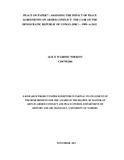| dc.contributor.author | Nderitu, Alice W | |
| dc.date.accessioned | 2013-11-25T11:24:38Z | |
| dc.date.available | 2013-11-25T11:24:38Z | |
| dc.date.issued | 2013-12 | |
| dc.identifier.citation | Degree Of Master Of Arts in Armed Conflict and Peace Studies | en |
| dc.identifier.uri | http://erepository.uonbi.ac.ke:8080/xmlui/handle/123456789/59998 | |
| dc.description | A research project paper submitted in partial fulfillment of
the requirement for the award of the Degree Of Master Of
Arts in Armed Conflict and Peace Studies, Department Of
History and Archaeology, University Of Nairobi | en |
| dc.description.abstract | This study was about the failure of peace agreements to solve the conflicts in the Democratic
Republic of Congo. The experience of peace agreements from many countries emerging
from conflict, the DRC included has been that peace agreements either hold or collapse.
However, there is no systematic study on the DRC peace processes that help to link “peace
on paper” to actual sustainable peace on the ground. Despite the many peace agreements
signed to end war, there has been continuous resurgence of conflict. The failure in the DRC
to transfer the “peace on the paper agreements” to cessation of hostilities among the warring
parties and a sustained peace is yet to be understood.
This research is based on the theory of the conflict layer model propagated by Fisher et
al.2000:27. Fisher posits that the notion of needs, positions and interests taken while
attempting to end conflict by negotiators at the peace table is crucial in understanding why
the agreements fail. The study aimed to study four hypotheses namely; that failed peace
agreements are responsible for escalating the conflicts in the DRC, that the natural resources
are prime movers of the conflict, the international community has contributed to the conflict
in the DRC and that political will is critical to the implementation of peace agreements.
Based on primary and secondary sources, this study argues that the peace agreements have
neither had an effect on the ending of the conflict nor changed the perceptions of actors
about the conflict.
The study established that at the centre of the conflict is the vast mineral wealth that the
DRC has, whose exploitation by rebel groups, neighboring countries and the international
community is not addressed in any of the peace agreements. There groups constitute the
many beneficiaries to the state of the constant conflict that the DRC finds itself as instability
provides a useful cover to plunder the country’s resources.
The study further argues that the more than 20 peace agreements arrived at since 1999 have
failed, as they are weak on implementation. They include the much touted Lusaka peace
agreement of 1999 prior to which there had been 23 failed Southern African Development
Community (SADC) and Organization of African Unity (OAU) sponsored meetings at the
Ministerial or Presidential level aimed at brokering an end to the war in addition to efforts of
many individual leaders in the region.
Today, the war in Eastern Congo, despite the peace agreements is escalating and could soon
escalate into a regional crisis once again. A new round of fighting between the Congolese
army and the M23 group in 2013 threatened to derail current ongoing peace processes. No
amount of peace agreements and international involvement – will end the war until the
militarization of conflicts based on mineral resources is sorted out. | en |
| dc.language.iso | en | en |
| dc.publisher | University of Nairobi | en |
| dc.title | 'Peace on paper?’: assessing the impact of peace agreements on armed conflict: the case of the democratic republic of Congo (DRC) – 1999- to 2012 | en |
| dc.type | Thesis | en |
| local.publisher | Department Of History and Archaeology | en |

